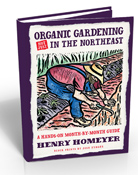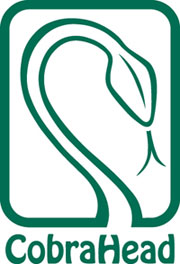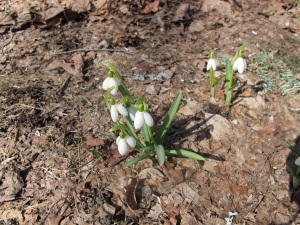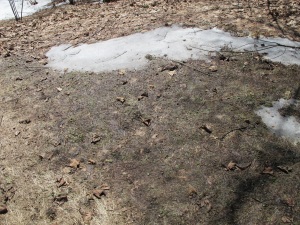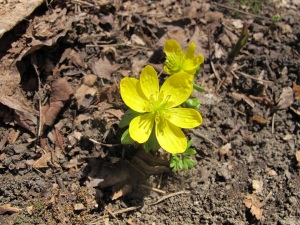Spring Activities
Spring has been slow in showing its colors. Snowdrops, usually up in early March at my house, were a month late. Crocus, the early ones, and winter aconite (a flower that is a nice school bus yellow color) are finally blooming. But everything is slow, and the ground is still frozen a few inches down. I won’t be planting anything outside for weeks.
So what can we do on a warm, sunny day? Maybe we better start by thinking about what NOT to do. Don’t rake the lawn while the soil is still soggy. I recently saw a fellow raking his lawn – even though there was still snow on it in places. Soil structure can be damaged if you compress it and squeeze out all the air spaces in it. This is easily done by walking on it when the soil is still frozen and wet – it’s very fragile. And it’s easy to rip out your grass with a rake if it hasn’t woken up and turned green.
Don’t rototill your vegetable garden early, either. If you are going to rototill, wait until the soil is good and dry. Take a handful of soil and squeeze it into a ball or cylinder. Then, with your other hand, tap it with a finger. It should fall apart. You want the soil crumbly before rototilling, though some clay soils never get to that point. Rototilling sticky wet soil can create heavy clods that roots will not easily penetrate.
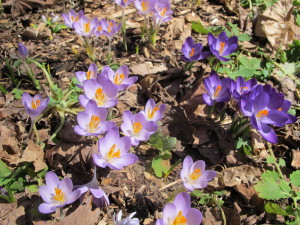
So what can you do now? As soon as the snow disappears you can collect a soil sample and send it off to your state university extension service. Just Google “soil test” and your state, and you will find where to send a sample and how to collect it. I usually sun dry a sample on a cookie sheet, and remove any bits of grass, roots and rocks. As a rule of thumb, it is good to collect your sample from the depth where roots will be. For most things, that is 4 to 6 inches deep.
If you live in a house that was built before 1978, its exterior paint probably has some lead in it. Lead paint has been shown to contaminate soil and to be picked up by plants; this is most severe within 20 feet of the house, or even further if you are on a hill. Testing for heavy metals can be expensive: in New Hampshire the test for it is $65. But if you have small children and will be gardening near the house, it is a worthwhile one-time investment. Children are most severely affected by lead poisoning.
Root crops are the worst offenders when it comes to picking up lead and arsenic, another heavy metal. Lead was an additive to gasoline up until 1996 in most states, and lead from exhaust can still be a problem within 100 feet of a major highway. Arsenic was used as an insecticide, particularly in apple orchards up until the 1980’s, either as lead arsenate or calcium arsenate. Heavy metal compounds like that do not dissipate or disappear easily or quickly.
So how can you improve your soil? In a word, compost. Good compost is biologically active, meaning that it is full of beneficial microorganisms – bacteria and fungi. Later, when my lawn has turned green, I may spread some compost on it to improve the soil. All I do is fling compost over the lawn with a shovel, and then use a lawn rake to even it out.
Half an inch of compost spread out over the lawn will help a lot, particularly if you have used chemicals on the lawn. Fertilizers and particularly “Weed-n-Feed” products inhibit the growth and survival of microbes that will give your lawn that springy feel when you walk on it barefoot this summer. Compost adds organic matter and carbon to feed microbes that can’t use photosynthesis to get their own food. Earthworms love compost, too. Add compost, and they will come and help to get it down into the soil.
I have, carefully, raked leaves off one of my bulb beds. I did so recently. I was delighted to see, beneath a layer of leaves, the tips of daffodils and other bulbs were showing. I didn’t walk into the bed, as that would compact the soil, so I just reached what I could from the edge. That meant the back of the bed stayed unraked for now.
I have been known to lay down boards to walk on to avoid soil compaction at this time of year. Six-inch wide boards cut in five-foot lengths are good: they are light enough to move around, but do a good job of distributing my weight. Two or three is all you need. And once, to avoid compacting the soil, I wore my snowshoes. The neighbors probably thought I was crazy!
This is a good time of year to do a little maintenance on your tools. Take a big, rough file and sharpen the edges of your shovels and hoes. Just try to mimic the angle that exists already. A sharp tool works so much better than a dull one.
I apply boiled linseed oil once a year to keep wooden handles from drying out. I paint it on, let it soak in, and then rub the handles with a rag to polish them up. The handle on my potato hoe, which I got from my family’s garage 30 years ago, is probably 50 years old – but still smooth, strong and splinter-free because I take good care of it.
So don’t rush into spring. Enjoy a warm lazy day from the deck and know that soon the soil will be dry enough to start raking.
Henry Homeyer has a new book: The New Hampshire Gardener’s Companion, Second Edition. This edition has 2 new chapters and updated information in all chapters. His e-mail is henry.homeyer@comcast.net.

